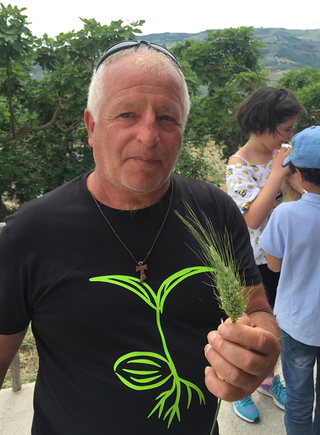Reposted from Government Farm Workers Alaska 1916 | Big Picture Agriculture
Back to the future for the wheat of tomorrow Farmers in Italy experiment with evolutionary populations

Podcast: Play in new window | Download (Duration: 20:35 — 17.1MB)
Subscribe: Google Podcasts | Spotify | Android | RSS | More
 The plant breeding behind the green revolution has delivered amazing results, way more than two ears of corn where one would grow before. Those gains, however, depend on tailoring the environment in which the seeds are planted to suit those modern varieties. If a farmer can’t afford to do that, or isn’t willing to use the herbicides and fertilisers modern varieties require, they’re kind of stuck. The market isn’t really interested in providing the kinds of varieties you need.
The plant breeding behind the green revolution has delivered amazing results, way more than two ears of corn where one would grow before. Those gains, however, depend on tailoring the environment in which the seeds are planted to suit those modern varieties. If a farmer can’t afford to do that, or isn’t willing to use the herbicides and fertilisers modern varieties require, they’re kind of stuck. The market isn’t really interested in providing the kinds of varieties you need.
Before the explosion of scientific breeding, however, farmers did their own plant breeding, by selecting the best plants and saving their seeds to sow the following year. The plants were genetically diverse, so there were always some that would do better and others that would do worse. Modern varieties are entirely uniform, so if conditions aren’t perfect, the whole field does poorly. While some farmers are rediscovering the benefits of the old varieties created in just such a way, a few are looking to create the future. They won’t adapt the environment to suit their crop; instead, they’re adapting the crop to suit their environment. The process is based on hugely diverse evolutionary populations of wheat, and it is giving the farmers wheat that performs better now and that will be able to track whatever climate change brings.
Italy has been suffering a drought this year, but the farmers who are working with these evolutionary populations are much less bothered by it than those who depend on modern wheats. The work with evolutionary populations is part of an experiment organized by Rete Semi Rurale, to help farmers get the kinds of varieties they need, an important part of which is to show local farmers what the experiment is about. I joined them on one such open day in the southern Italian region of Molise.
Notes
- Matteo Petitti is sharing the results of the research at his website.
- Molise is a bit of an undiscovered gem (to me at any rate). The Pettaciato’s farm is not an agriturismo, but there are lots of lovely places to stay in the region
Eat This Newsletter 058 It’s all connected
24 July 2017
This week’s haul is full of things I obsess about, not because I obsess about them but because they just happened to show up.
First, there’s the whole question of food regulations, which I’ve long maintained are necessary only as a substitute for the trust that comes with knowing who grows your food. Nowhere is this more true than in the organic sector. Once there are rules, there are rule benders, like the “certified organic” egg farm that apparently keeps 3 birds per square foot of floor space, with scant access to the outdoors or any expression of their natural behaviour. And rule breakers, like the companies importing large quantities of organic grain and soybeans that are anything but organic. Sen. Pat Roberts said that “uncertainty and dysfunction have overtaken” organic standards in the US. I’d say that they’ve always been there, baked into those standards.
Then there are fermenting Jews. Sandor Katz was on The Food Programme from the BBC last week, spreading his very sensible gospel. Jonathan Katz shared his own particular version of Fun with Pickles. And a review of a new book, The Joys of Jewish Preserving, from Emily Paster. Meanwhile, I’m discovering that you need more than three plants of Parisian Pickling to get enough cornichons simultaneously to make even a small batch.
To India, and an article by Rahul Goswami on the costs – economic and environmental – of being part of the global economy. Goswami dissects some of the figures on food imports and concludes that “the saving of enormous sums of money can … be had if we but reduce and then cut out entirely the wanton import of food and beverages, and processed and packaged food products”. Self-sufficiency brings its own problems, though, like “high levels of antibiotic-resistance in Indian poultry farming”. And exports of Darjeeling tea are in trouble too.
A new report from Chatham House, a UK think tank, puts India’s problems with globalisation in perspective. Chokepoints and Vulnerabilities in Global Food Trade identifies 14 places through which large amounts of food, feed and feriliser pass. A blockage in any one of them, the report warns, “could conceivably lead to supply shortfalls and price spikes, with systemic consequences that could reach beyond food markets”. It also offers advice on how to avoid such blockages.
And, a couple of bits and bobs from some previous guests on the show.

